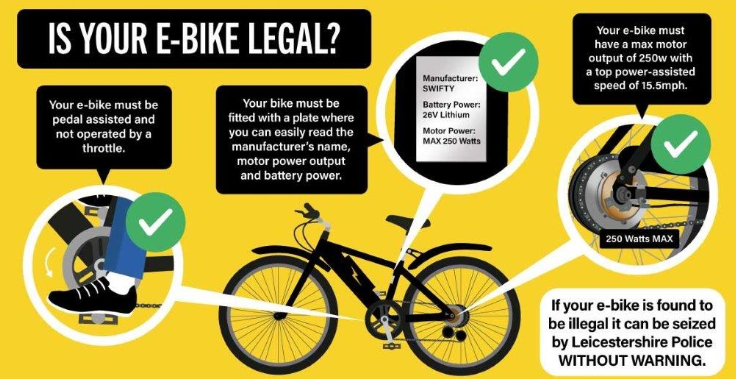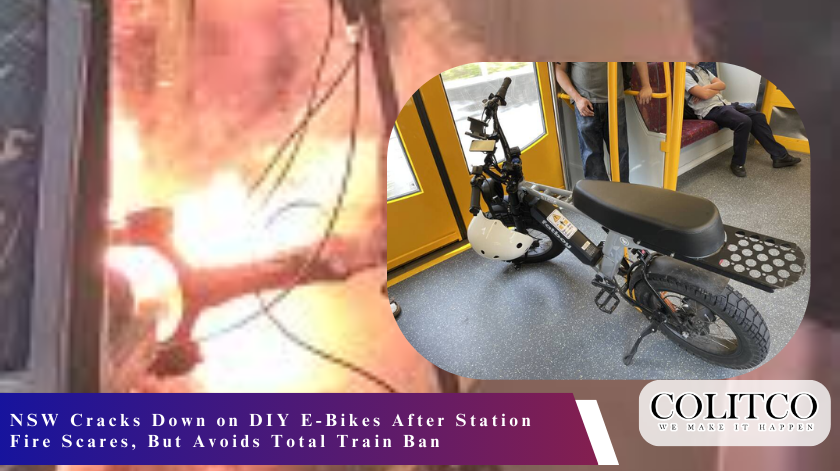nsw-cracks-down-on-diy NSW authorities have taken decisive action against fire-prone converted e-bikes while carefully avoiding a blanket prohibition that could have disrupted thousands of commuters across Sydney’s rail network.
The state government announced a targeted ban on converted e-bikes effective November 1, 2025, following a series of battery fires that raised serious safety concerns at major stations. However, the policy stops well short of the total e-bike prohibition initially considered by transport officials.
Fire Incidents Spark Safety Crackdown
Transport authorities have been monitoring the risk of lithium-ion fires after two recent e-bike fires at Liverpool Station in August, Blacktown Station in April (which involved a converted e-bike) and on a Melbourne suburban train in March.
The numbers paint a concerning picture for NSW authorities. Since the beginning of the year, Fire and Rescue NSW has reported 77 fires related to e-bike or e-scooter lithium-ion battery blazes.
These incidents aren’t minor inconveniences. nsw-cracks-down-on-diy These kinds of fires are particularly hard to extinguish as batteries can explode, release toxic and flammable vapour, and reignite without notice.
What Gets Banned and What nsw-cracks-down-on-diy Doesn’t
The new restrictions target a specific category of devices that nsw-cracks-down-on-diy pose the highest fire risk. Converted e-bikes are defined as regular pedal bikes that have been fitted with batteries and motors. These have higher risk of electrical failure due and fire risk due to DIY installations, inadequate wiring and use of second-hand batteries and incompatible or poor-quality components.
Devices affected by the ban:
- DIY converted e-bikes (regular bikes retrofitted with motors/batteries)
- Only on Sydney Trains, NSW TrainLink, and Metro services
What remains unrestricted:
- Factory-made e-bikes
- Shared e-bikes
- Mobility devices for disability purposes
- Travel on buses, ferries, and light rail
- Use in concourses, lifts, escalators outside fare gates
Transport Minister John Graham explained the balanced approach. “Taking out the highest risk-e-bikes is a sensible and balanced step, but we will watch this space very closely and take further action if necessary,” he said.
Hefty Penalties for Rule Breakers
The government isn’t taking enforcement lightly. Carriage of a restricted converted e-bike would carry a penalty notice offence of $400 with a maximum penalty of 10 penalty units ($1,110).

The growing popularity of e-bikes has led to misuse and dangerous roadside behaviour
These fines mirror existing penalties for carrying petrol-powered devices on trains, signaling authorities treat converted e-bikes as equally dangerous.
Industry Consultation Prevents Total Ban
The decision came after extensive community feedback that revealed strong opposition to broader restrictions. “The overwhelming message from the consultation was that banning all e-bikes from trains would go too far,” Minister Graham noted.
Transport for NSW received around 3,000 responses during its public consultation period. Delivery services, whose drivers frequently rely on e-bikes, were among key stakeholders who successfully argued against a complete prohibition.
The scale of potential disruption was significant. As the number of e-bikes and e-scooters in NSW surges past 1.3 million, we need to find the right way to mitigate the fire risk on trains.
Safety Standards Tighten Across Industry
The transport restrictions complement broader safety reforms across NSW’s e-bike market. From February 2025, new lithium-ion battery safety standards became mandatory for all devices sold in the state.
From 1 February 2025, lithium-ion e-micromobility devices, such as e-bikes and e-scooters, sold in NSW must comply with the prescribed safety standards. These requirements have been introduced to ensure that only safe and compliant products are available in the market, reducing the risk of fires.
Retailers face substantial penalties for non-compliance, with fines reaching up to $825,000 for businesses that sell unsafe products.
Underground Risk Concerns Drive Policy
The specific focus on train services reflects unique safety challenges in Sydney’s transport network. “The risk of a lithium battery fire on a train in a tunnel or in an underground station is very concerning and the safety of our passengers and staff is our number one priority,” officials emphasized.
It would not apply on light rail, buses and ferries due to mitigating risk factors including a greater ability to rapidly discharge passengers.
This risk-based approach acknowledges that underground stations and tunnel sections create evacuation challenges that surface transport modes don’t face.
Federal Cooperation on Standards
NSW and Victorian transport ministers have escalated the issue to federal level, seeking stronger national standards. The states want Commonwealth support in strengthening Australia’s approach to e-device safety, ensuring all imported and sold devices meet consistent safety standards.
This cooperative approach could prevent a patchwork of different state regulations while addressing supply chain issues at their source.
What This Means for Commuters
For most e-bike users, daily routines won’t change. Factory-made e-bikes nsw-cracks-down-on-diy from reputable nsw-cracks-down-on-diy manufacturers will continue operating normally on all transport modes.
However, anyone using DIY conversions needs to find alternative transport arrangements or consider upgrading to compliant devices. Given the growing importance of sustainable transport in urban planning, this represents a significant shift for budget-conscious riders who chose conversion over purchase.
Also read: Platina Resources Divests Xanadu Project to Focus on Mt McKenna Gold Project Growth
Final Thoughts
The NSW government’s measured response balances legitimate safety concerns with practical transport nsw-cracks-down-on-diy needs. By targeting the highest-risk devices while preserving broader e-bike access, authorities have avoided potential backlash while addressing genuine fire hazards.
This targeted approach may serve as a model for other states grappling with similar safety challenges as e-bike nsw-cracks-down-on-diy adoption continues expanding across Australia’s rapidly evolving transport infrastructure.
Frequently Asked Questions
Q: When does the converted e-bike ban start?
A: The ban takes effect November 1, 2025, on Sydney Trains, NSW TrainLink, and Metro nsw-cracks-down-on-diyservices.
Q: Can I still take my store-bought e-bike on trains?
A: Yes, factory-made e-bikes remain permitted on all NSW transport services.
Q: What’s the fine for bringing a converted e-bike on a train?
A: Penalty notices start at $400, with maximum fines reaching $1,110.
Q: Do the rules apply to buses and ferries?
A: No, the restrictions only affect train and metro services.












